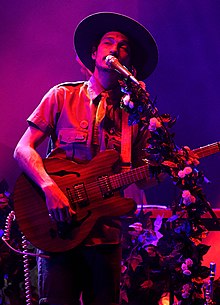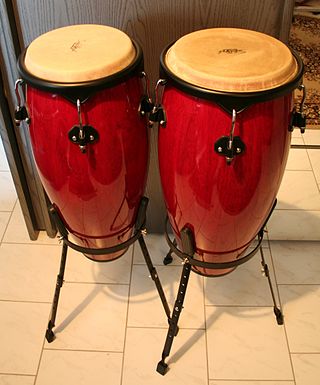
Salsa music is a style of Caribbean music, combining elements of Cuban, Puerto Rican, and American influences. Because most of the basic musical components predate the labeling of salsa, there have been many controversies regarding its origin. Most songs considered as salsa are primarily based on son montuno and son Cubano, with elements of cha-cha-chá, bolero, rumba, mambo, jazz, R&B, rock, bomba, and plena. All of these elements are adapted to fit the basic Son montuno template when performed within the context of salsa.
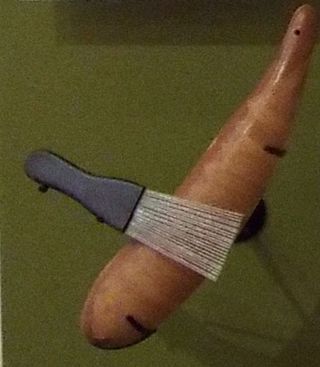
The güiro is a percussion instrument consisting of an open-ended, hollow gourd with parallel notches cut in one side. It is played by rubbing a stick or tines along the notches to produce a ratchet sound.
Latin jazz is a genre of jazz with Latin American rhythms. The two main categories are Afro-Cuban jazz, rhythmically based on Cuban popular dance music, with a rhythm section employing ostinato patterns or a clave, and Afro-Brazilian jazz, which includes samba and bossa nova.

Indigenous music of North America, which includes American Indian music or Native American music, is the music that is used, created or performed by Indigenous peoples of North America, including Native Americans in the United States and Aboriginal peoples in Canada, Indigenous peoples of Mexico, and other North American countries—especially traditional tribal music, such as Pueblo music and Inuit music. In addition to the traditional music of the Native American groups, there now exist pan-Indianism and intertribal genres as well as distinct Native American subgenres of popular music including: rock, blues, hip hop, classical, film music, and reggae, as well as unique popular styles like chicken scratch and New Mexico music.

Merengue is a type of music and dance originating in present day Dominican Republic which has become a very popular genre throughout Latin America, and also in several major cities in the United States with Latino communities. Merengue was inscribed on November 30, 2016 in the representative list of the Intangible Cultural Heritage of Humanity of UNESCO.

Café Tacuba, stylized as Café Tacvba, is a band from Naucalpan de Juárez, State of Mexico. The group gained popularity in the early 1990s. They were founded in 1989, before they had the current lineup of Rubén Isaac Albarrán Ortega, Emmanuel del Real Díaz, José Alfredo "Joselo" Rangel Arroyo, and Enrique "Quique" Rangel Arroyo:, their friend Roberto Silva played the keyboards for a short period of time. Since the Cuatro Caminos World Tour, Luis "El Children" Ledezma has played the drums in every concert but is not considered an official member of the band, as well as Ramiro Del Real Díaz, who joined the band as a support musician playing the guitar since 2015.

Alejandro Sánchez Pizarro, better known as Alejandro Sanz, is a Spanish musician, singer and composer. He has won 22 Latin Grammy Awards and four Grammy Awards. He has received the Latin Grammy for Album of the Year three times. The singer is notable for his flamenco-influenced ballads, and has also experimented with several other genres including pop, rock, funk, R&B and jazz.

Timba is a Cuban genre of music based on Cuban son with salsa, American Funk/R&B and the strong influence of Afro-Cuban folkloric music. Timba rhythm sections differ from their salsa counterparts, because timba emphasizes the bass drum, which is not used in salsa bands. Timba and salsa use the same tempo range and they both use the standard conga marcha. Almost all timba bands have a trap drummer. Timbas also often break the basic tenets of arranging the music in-clave. Timba is considered to be a highly aggressive type of music, with rhythm and "swing" taking precedence over melody and lyricism. Associated with timba is a radically sexual and provocative dance style known as despelote. It is a dynamic evolution of salsa, full of improvisation and Afro Cuban heritage, based on son, Rumba and mambo, taking inspiration from Latin jazz, and is highly percussive with complex sections. Timba is more flexible than salsa and includes a more diverse range of styles. Timba incorporates heavy percussion and rhythms which originally came from the barrios of Cuba.

Stephen Robert Nesta Marley is a Jamaican-American musician. The son of Bob Marley, Marley is an eight-time Grammy Award winner, three times as a solo artist, twice as a producer of his younger paternal half-brother Damian Marley's Halfway Tree and Welcome to Jamrock albums, and a further three times as a member of his older brother Ziggy Marley's group Ziggy Marley & The Melody Makers.

Eddie Palmieri is an American Grammy Award-winning pianist, bandleader, musician, and composer of Corsican and Puerto Rican ancestry. He is the founder of the bands La Perfecta, La Perfecta II, and Harlem River Drive.

Mexican cumbia is a type of cumbia, a music which originated in Colombia but was later reinvented and adapted in Mexico.

Obie Bermúdez is a Puerto Rican Latin pop, salsa singer, composer and actor.

Gustavo Alfredo Santaolalla is an Argentine composer and musician. Known for his minimalist approach to composing, he rose to fame for creating the scores for Brokeback Mountain (2005) and Babel (2006), for which he received two Academy Awards for Best Original Score in consecutive years. Santaolalla also gained recognition for his work on The Last of Us game series, composing the 2013 title and its 2020 sequel. He returned to reprise his themes and co-compose the score for the 2023 television adaptation.

Raúl Alejandro Escajadillo Peña, known by his stage name, Aleks Syntek, is a Mexican singer and songwriter. He has earned nine nominations for the Latin Grammy Awards, a Grammy nomination, five nominations for the MTV Latin Awards, and is the winner of three Latin Billboard awards. He has also received an Ariel award from the Cinametografia Mexican Academy for Best Film Music.

Selena is the debut studio album by American Tejano singer Selena, released on October 17, 1989, by EMI Latin. Its music incorporates a range of contemporary genres with a mix of cumbia and regional styles of Mexican music. The album was released following company president Jose Behar's failed crossover request for the singer. The project was denied by the heads of EMI Records' pop division, believing the singer should first strengthen her fanbase. Selena's brother and principal record producer and songwriter, A.B. Quintanilla III fought to remain the singer's producer. The band introduced Pete Astudillo and Joe Ojeda, who contributed to the album's experimental production and songwriting. Aside from A.B., Selena worked with two Mexican songwriters, Alejandro Montealegre and Reinaldo Ornelas.
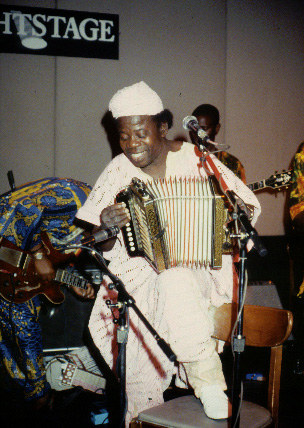
Isaiah Kehinde Dairo MBE was a Nigerian Jùjú musician.

Rudy Amado Pérez is a Cuban-born American musician, songwriter, composer, producer, arranger, sound engineer, musical director and singer, as well as entertainment entrepreneur, and philanthropist. His area of specialty is ballads, although he has also worked in a variety of other genres.
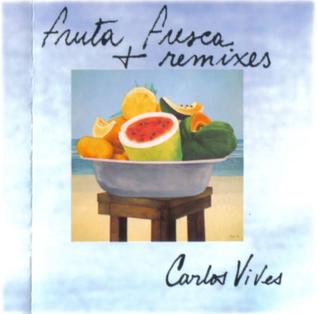
"Fruta Fresca" is a vallenato song written and performed by Colombian recording artist Carlos Vives and produced by Emilio Estefan and Juan Vicente Zambrano as the lead single from his studio album El Amor de Mi Tierra (1999). The song incorporates the sound of Latin pop and Colombian vallenato music. In the song, he compares his lover's kisses to fresh fruit. The track was well received by critics who praised the production of the record. "Fruta Fresca" became Vives' first number-one hit on the Billboard Hot Latin Songs chart. It is recognized as one of his signature songs.
Jorge Siddhartha González Ibarra, better known as Siddhartha, is a soloist rock musician based in Mexico. Siddhartha began his solo career after being the former drummer of Zoé. He has recorded six albums: Why You?, Náufrago (Castaway), El Vuelo Del Pez, Únicos (uniques), memoria futuro and 00:00.

Play is the second extended play by Puerto Rican singer Ricky Martin. It was released on July 13, 2022, through Sony Music Latin. Originally planned as a full-length album, Martin changed the concept following the spread of the COVID-19 pandemic and his experience with panic attacks. He split the album into two EP's, Pausa, which was released in May 2020, and Play. It was promoted with two singles, "Otra Noche en L.A." and "A Veces Bien y a Veces Mal". The former was a commercial success in Latin America, while the latter, which is a collaboration with Reik, became a top-10 hit in Mexico and Puerto Rico.
